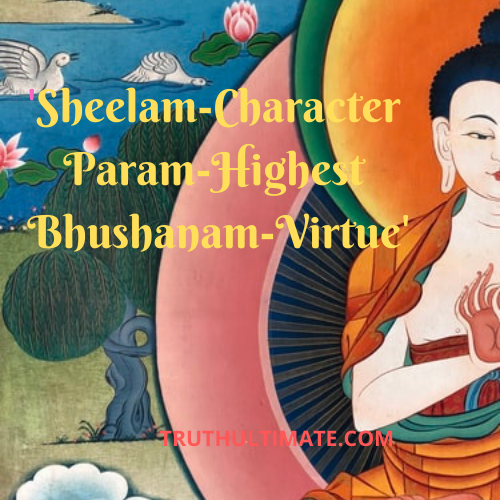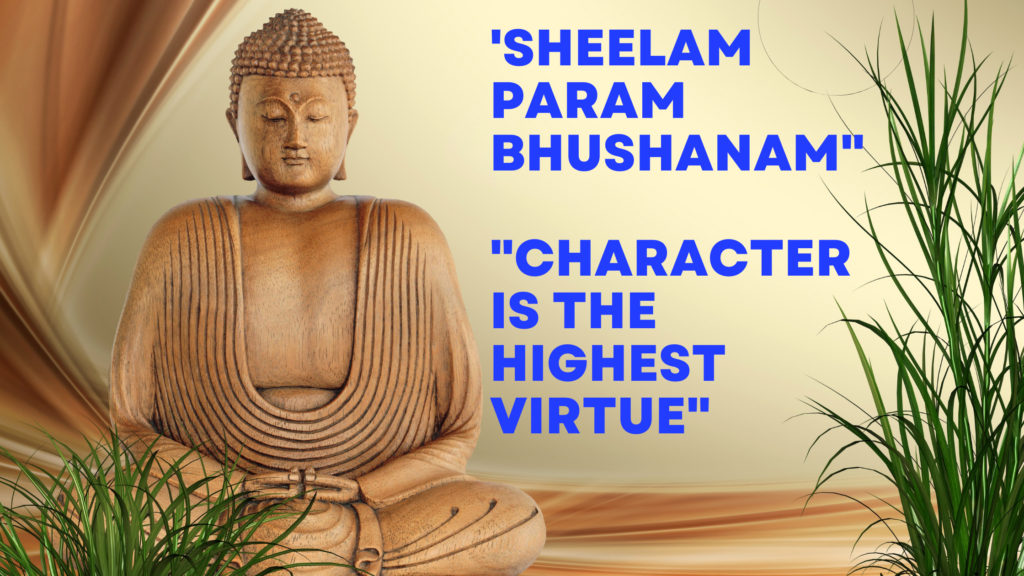Sheelam Param Bhushanam is one of the most important teachings of Indian culture and tradition.
Sheelam means character, Param means highest or best, and Bhusanam means ornament or jewels.
Collectively, this Sanskrit phrase means, ‘character is the highest virtue.’
It may seem like a normal quotation or phrase, however, this phrase holds a very special place in the Indian cultural legacy.

Indian culture and history are filled with philosophical and moral practices that have guided the Indian nation in its journey to the point where it has reached today.
Indians have embedded the teachings of ancient personalities and figures in many ways, such as in Yoga and civil services.
They have utilized the diverse teachings of ancient India in Sanskrit from their past to shape their better present and foreseeing future.
Sheelam Param Bhushanam Meaning
Sheelam Param Bhushanam is a great verse or a ‘shloka’ encrypted in the old and scientific language, Sanskrit.
This means that this is not just for chanting; rather, this verse has to be embedded in one’s personality and mind to manifest in daily life.
The verse aims to achieve a dynamic and high-performing character for a human being.
This also implies inculcating the superb quality into the civil servants for better governance and in tune with establishing the welfare state with ethical and social values.

As you all know, this verse is Sanskrit sloka, and many spiritual masters through scriptures have enlightened us to improve our lifestyle and well-being.
Simply, this Sanskrit verse implies its meaning as “character is the highest virtue.”
However, you cannot understand the correct meaning of any verse or sloka, just by its literal meaning or chanting it.
Hence, you need to understand the absolute words to learn the in-depth interpretation it possesses.

In the Pali language, the language in which all Buddhist scripture is found, Sheelam means Sila, and it means “the morality”.
The Sila is a virtue given the highest importance while defining the value of a human being.
The Sila, The Samadhi, and the Pragya-these three ingredients are the foundation of a human being who is on the path of spiritualism.

The Sila is the right virtue which comprises- Truth, Non-violence, Asteya or Non-stealing, Aprirgraha or Non-hoarding, and Brahmcharya or Celibacy.
The Samadhi is the right meditation or right concentration of mind to attain the highest understanding of “the self”.
The Pragya is a Sanskrit word combination of two attributes-Pratyksha means direct and Gyan means knowledge.
Pragya implies pratksha gyan or direct knowledge. Pragya is considered as direct knowledge or the first-hand experience of the self and the supreme consciousness or the ultimate Truth.

This knowledge is considered as the highest one compare to any other knowledge. The other knowledge comes by hearing or reading scriptures which is the knowledge of others. However, direct knowledge emerges from own experience.
All the components-Sila, Samadhi, and Pragya are interlinked and interrelated with each other and based on the cause and effect theorem.
One propels others to be effective and qualitative. If someone follows Sila and Samadhi, this leads to the realization of direct knowledge.

A civil servant or a civil service aspirant must be dedicated to being achieving a pious and enlightened character without having any selfish ideas in their personality.
The servant or aspirant should aim to become a better person through this verse to perform every duty whether it is personal or professional, in the best favor of their country.
Sheelam Param Bhusanam : ideology
Sheelam Param Bhusanam’s ideology resonates with the ideology of an enlightened one, Lord Buddha.
Buddha’s five main morals that were pointed towards producing a selfless personality are the very aim of Sheelam Param Bhushanam’s motto.
To understand the true meaning of this shloka, one must learn and implement the following five principles in life:

- Ahimsa–Never inflict harm, physical or psychological, to any living creature on Earth under any circumstance.
- Asteya–Not to take away from anyone, what is not intended to be given to you. Do not steal anything from anyone’s possession.
- Brahmacharya–One should never become a part of any sexual misconduct.
- Buddha, however, instructs to follow celibacy sometimes, but this is not what the civil services demand.
- Although, one should stay away from delinquency in all situations.
- Satya or Truth–Not to give off any false information about oneself or someone else. With or without the intention of harm.

- Stay within a safe limit from alcoholic beverages and do not indulge in any misconduct because of intoxication.
- Lord Buddha, however, has strict instructions about staying away from alcohol.
Thus, after breaking down the ideology of Sheelam Param Bhushanam we learn that Sheelam means a character of good morals and values.
The other two words Param and Bhushnam teach that no ornaments are better than your pure character.
If you are a person of high moral character then it is the best thing you can wear.
It is your richest asset and no one can ever steal that from you.
Your golden character makes you shine among the masses and you reflect as a successful, energetic, and wonderful human not only in this world but in the life hereafter.
Sheelam Param Bhushanam Sanskrit
Sanskrit writers cultivated the essence of philosophy, religion, and morals in their writings in ancient India.
All their writings in the form of poetry and subhashitas are a work of great intellectual level.
The Sanskrit sloka sheelam param bhushanam finds its place in several manuscripts, whether it is ‘Panchtatra’ or ‘Nitishatkam’.
Character is the most important ornaments of human beings rather than gold, diamond, or any otherworldly things.

शीलं परमं भूषणम्
Sheelam Param Bhushanam
It is greatly explained in the Sanskrit scriptures that a man who possesses all the wealth, however devoid of sheelam or character, is worthless.
The whole philosophy and teaching reiterate that it is the Sila or Character which must be of the highest value rather than anything else.
They convey good thoughts, positivities, and learned epigrams through their sayings and writings.
These epigrams are widely used to spread essential attributes among the people.

Sheelam Param Bhushnam is also one of the Sanskrit shlokas which has a golden meaning to it.
It summarizes all the good moral qualities like selflessness, integrity, objectivity, transparency, and honesty.
This three-word shloka highlights many qualities that make up a good character and ultimately a good human.
Thus, motivating many people to practice morality and ethical values in their lives and helping to establish a better society.
Sheelam Param Bhushanam LBSNAA
Lal Bahadur Shastri National Academy of Administration, LBSNAA, is a premier civil service training institute located in Mussoorie, Uttarakhand India.
LBSNAA provides training and study programs on public administration and public policy.
The main purpose of Lal Bahadur Shastri academy is to produce IAS officers and to conduct the Civil Service Foundation Programme for Group-A Central Civil Services.

The motto of Lal Bahadur Shastri National Academy of Administration, LBSNAA, is Sheelam Param Bhushanam, ‘character is the highest virtue’.
The academy aims to inscribe this ideology into the minds, hearts, and lives of the civil services.
This produces just like it is inscribed on the wall of the apex academy.
Sheelam Param Bhusanam is the motto of LBSNAA and not any other Sanskrit ideology because being an excellent civil servant is all about having a strong character.
To have such a character, one needs to become a follower of Sheelam Param Bhushanam because this ideology requires a person to master the five-character cleansing principles.
sheelam param bhushanam: Role Model for the society
Our character is very important for a successful life and is the best ornament that you can wear.
There is no need to wear thousands of golden ornaments and jewels if you have high morals and character.
Society knows you by your good character, and that’s what makes you superior not your wealth.
Character is what defines you, and all the spiritual leaders have focused on this idea greatly.
If you lack character, you lack everything. Work on your character, and you will soon be a respectable person in your society.
There is a very high emphasis on good character and we all know, how important is to be respectful and kind in society.

A person’s character says everything about him, if a person devoid of good character is born into the family, it is often said that the person brings disgrace to the whole family.
So, you must be very careful when it comes to the character because if the character itself is golden, you are a real gem.
One’s character can influence others in achieving pre-determined goals or aims whether it is related to you personally or publicly or privately.
Being calm and following patience shows your character and is the biggest jewel one should have.
Even, the premier of this nation, PM Narendra Modi has focused on the development of character as it plays a great role in the training of the government officers.
If you have high morals and good character, you will eventually be the biggest asset in the prosperity of you, your family, and your country.
Good morals automatically bring a great sense of responsibility and accountability.

And, if the person serving us are responsible enough to do their designated work, we don’t need to fight for our rights anymore.
If people start fearing accountability, no one of us will do anything and that will bring trouble to the whole society.
What else do you need for a prosperous society and the nation? Focus on the character development and you will see the best shade of the outcome.
Conclusion
Most of the great leaders of ancient and modern India, like Saints, Rishis, Buddhas, great personalities, etc., became great because they followed and showed their characters in tune with the principle of Sheelam Param Bhushanam.
They embedded this ideology into their lives and observed their matters and decisions in the light of this doctrine.

They believed in the formation of a disciplined Sheelam (character) and the effects of a good Sheelam on one’s life and duties in life.
However, the true meaning of Sheelam Param Bhusanam has been diminishing, and the real value of this ideology needs to be revalued.
The value of morals and ethics that carved a man’s character has now gone down due to the rise of consumerism and materialism.
In ancient times, people used to measure the goodness of a person based on their character and its qualities.
However, these concepts are considered to be antiquated in this era where people judge others based on their financial and materialistic status.
The five basic morals that were to be the guiding path of implying Sheelam Param Bhusanam are now finding more relevance to maintain the order and value of society.
Very few are practicing them by heart and soul, contrary to the people in the earlier times who used to follow this principle to achieve an exemplary character exhibiting role model for the society.
One can never embrace Sheelam Param Bhushanam without observing, protecting, and applying its principles in every perspective of life.
What is the meaning of Sheelam Param Bhushanam?
Sheelam implies Character, Param means highest, and Bhushnam indicates virtue or jewels. Hence, the shloka Sheelam Param Bhushanam means “Character is the highest virtue.”
What is the meaning of Character is the highest virtue?
Human beings possess several fundamental virtues; however, Character is considered the most important virtue of a human being as per scriptures.
The ancient word Sheelam implies Character. The Sila, Samadhi, and Pragya are considered tri-jewels of Buddhism.
It is also believed that if the Character of a human being is lost, everything is lost.
Who said Character is the highest virtue?
The Sanskrit sloka Sheelam Param Bhushanam finds its place in several manuscripts, whether Panchtatra or Nitishatkam.’
Sheelam Param Bhusanam’s ideology resonates with the ideology of an enlightened one, Lord Buddha.
courtesy: Google images
References:
- https://m.facebook.com/220286121691037/photos/a.220291878357128/705569859829325/?type=3&source=44https://www.gfilesindia.com/sheelam-param-bhushanam-modi-tells-civil-servants/
- https://www.quora.com/What-is-the-meaning-of-Sheelam-Param-Bhushanam
- https://en.wikipedia.org/wiki/Lal_Bahadur_Shastri_National_Academy_of_Administration





